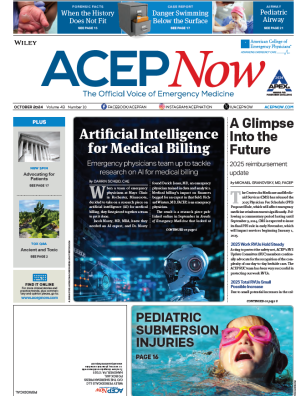Match Day was among the greatest days of my life. In one thrilling moment my loftiest dreams suddenly came true. Oh, the catharsis! So the following may be surprising: I wish Match Day had not been so wonderful; a large part of the ecstasy was the release of a tremendous amount of stress and anxiety built up over the preceding months and years.
Explore This Issue
ACEP News: Vol 31 – No 12 – December 2012Take a look at the picture of me on the next page. That is about 1 minute before I opened my letter. I think I look happy, yet absolutely terrified. Even better: look at the man-hug going on in the background. I’m actually not joking when I say that that’s just too much happiness!
Let me explain. If you are reading this, you probably experienced and well remember the match process. While difficult to endure, the rank list match algorithm is probably the most just system one can imagine for solving the problem at hand.
However, the process is startlingly opaque and I can’t see why certain aspects of this must continue to be the case, especially in the otherwise open and friendly field of emergency medicine.
So, yes, you read right: I wish Match Day had been less exciting because it would have meant that the process leading up to it had been less stressful and more transparent.
Of the various medical specialties, emergency medicine is among the least “malignant.” In the 11 departments where I have ever worked a shift, I have seen impressive collegiality and candor, originating among attendings and trickling down, affecting how fellows, residents, and students are treated both by their peers and higher ups.
There are refreshingly few “head games.” EM is indeed a sane field with helpful people. And yet just when the stakes get high during the residency application process, students are suddenly thrust into the dark.
One central problem: are students being recruited or judged? Both, of course. This makes it nearly impossible to gather information freely during an interview day, or in communications with programs.
Any given interview day, I had to balance fact finding against the need to avoid asking the “wrong” questions.
My recommendation for programs is to send out a PDF of Frequently Asked Questions to applicants who are granted interviews. It would be nice to have shift hour formats, salary, resident housing, amenities (ACEP dues, anyone?) prior to arrival.
Program directors may be reading this with a wary eye, thinking that this could start a kind of bidding war over what EM programs offer prospective students. Correct! Another major problem is that students apply to too many programs simply because they have to. I had no information other than hearsay as to whether I was competitive at certain programs. According to data from the National Residency Matching Program, once a student has garnered around 10 interviews, the odds of that student matching are better than 90%, assuming the student subsequently ranks all 10 programs on the certified list.
Pages: 1 2 3 | Single Page





No Responses to “Match Day: Too Good to Be…Good!”